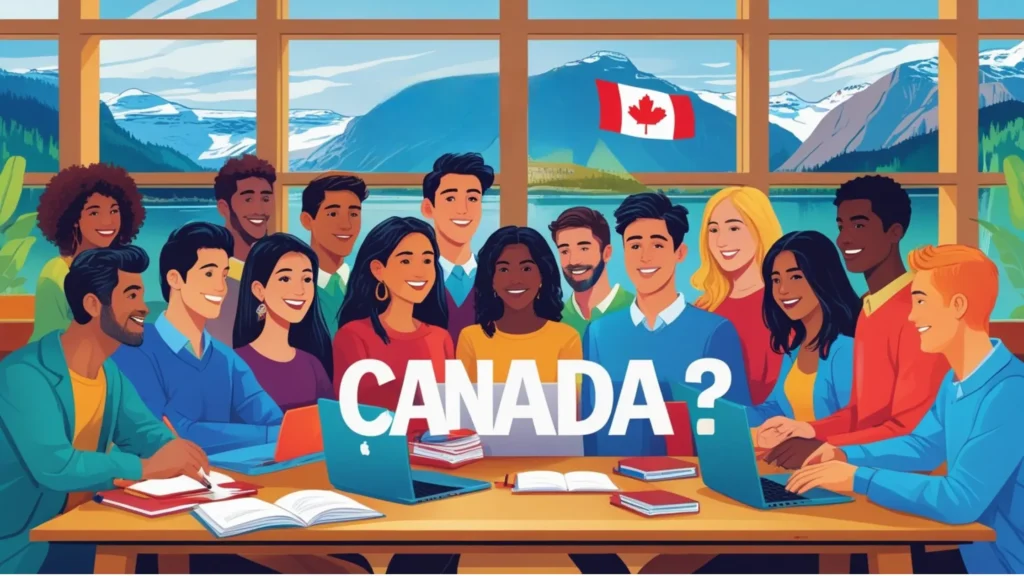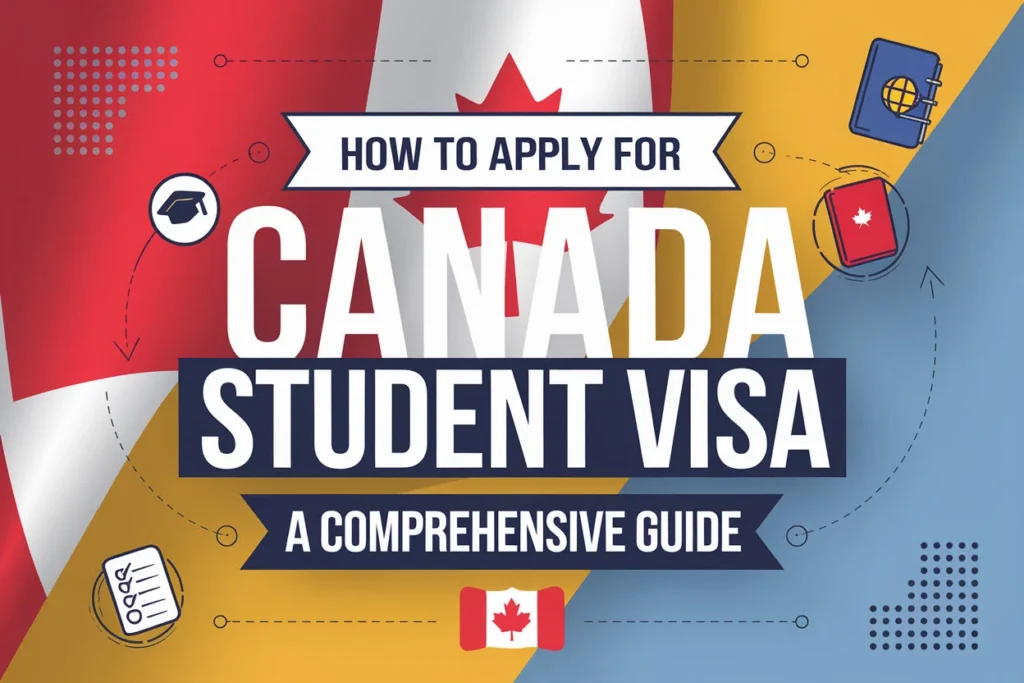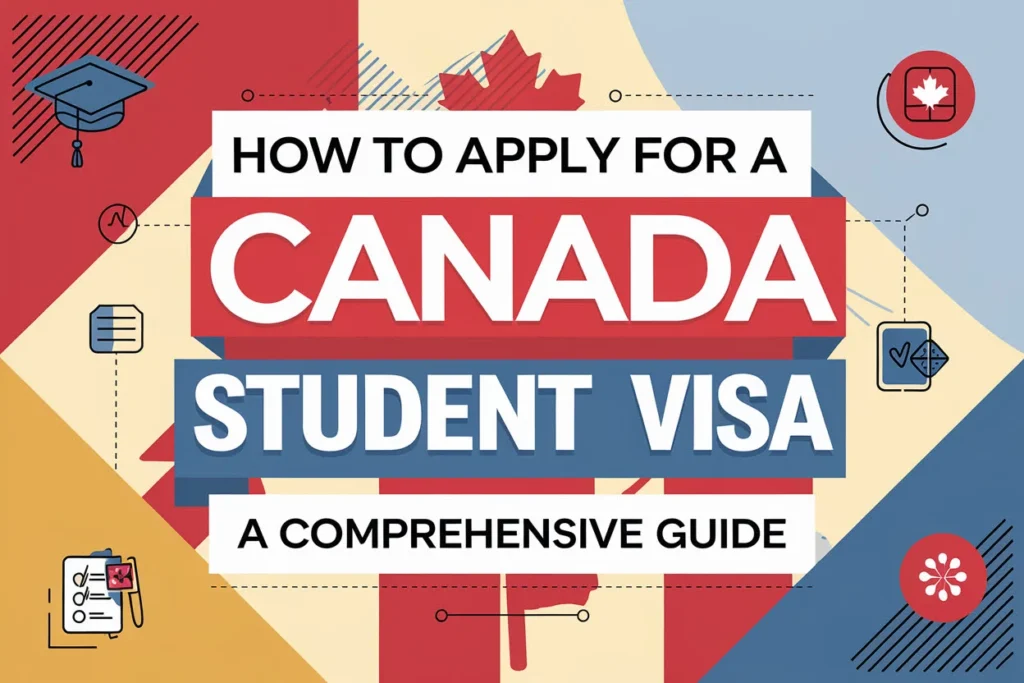Canada is one of the most sought-after destinations for international students, offering world-class education, a multicultural environment, and numerous opportunities for personal and professional growth. If you’re planning to study in Canada, obtaining a Canada student visa is a crucial step in your journey. This guide will walk you through the entire process of applying for a Canada student visa, ensuring that you meet all requirements and submit a successful application.
Table of Contents
What is a Canada Student Visa?
A Canada student visa, officially known as a Study Permit, is a document issued by Immigration, Refugees, and Citizenship Canada (IRCC) that allows international students to study at designated learning institutions (DLIs) in Canada. It is important to note that a Canada student visa is not the same as a visitor visa or an electronic travel authorization (eTA). While the Study Permit allows you to study, you may also need a visitor visa or eTA to enter Canada.
Why Study in Canada?

Before diving into the details of how to apply for a Canada student visa, let’s explore why Canada is a popular choice for international students:
- High-quality education: Research opportunities and academic excellence are well-known attributes of Canadian colleges and universities.
- Affordable Tuition Fees: Compared to other popular study destinations like the US and the UK, Canada offers relatively affordable tuition fees.
- Work Opportunities: International students with a valid Canada student visa can work part-time during their studies and full-time during scheduled breaks.
- Post-Graduation Work Permit (PGWP): After completing your studies, you may be eligible for a PGWP, which allows you to gain valuable work experience in Canada.
- Pathway to Permanent Residency: Canada offers various immigration pathways for international students to transition to permanent residency.
Also Read
IELTS vs PTE: Which is Easier?
Eligibility Criteria for a Canada Student Visa
To apply for a Canada student visa, you must meet the following eligibility requirements:
- Letter of Acceptance: You must have an acceptance letter from a designated learning institution (DLI) in Canada.
- Proof of Financial Support: You must demonstrate that you have sufficient funds to cover your tuition fees, living expenses, and return transportation.
- Clean Criminal Record: You may need to provide a police clearance certificate to prove that you have no criminal record.
- Medical Examination: Some applicants are required to undergo a medical examination to ensure they are in good health.
- Intent to Leave Canada: You must convince the immigration officer that you will leave Canada at the end of your authorized stay.
Canada Student Visa Fees Breakdown (2025)
| Fee Type | Cost (CAD) | Description |
|---|---|---|
| Study Permit Application Fee | 150 | Mandatory fee for processing your student visa application. |
| Biometrics Fee | 85 | Required for fingerprinting and photo collection (if applicable). |
| Total Basic Fees | 235 | Combined cost of the study permit application and biometrics fees. |
| Restoration of Status Fee | 350 | Applicable if you need to restore your status as a student. |
| Medical Exam Fee | 100–200 | Required for applicants from certain countries (cost varies by location). |
| Police Clearance Certificate | 50–100 | May be required depending on your country of residence (cost varies). |
| Visa Application Center Fee | 10–30 | Additional fee if applying through a Visa Application Center (VAC). |
Additional Costs to Consider
- Proof of Financial Support: You must show proof of funds to cover tuition fees and living expenses (approximately CAD 10,000–20,000 per year).
- Tuition Fees: Vary by institution and program, typically ranging from CAD 15,000 to CAD 50,000 annually.
- Health Insurance: Mandatory in most provinces (costs around CAD 600–1,000 per year).
Canada Study Visa Requirements: Your Gateway to World-Class Education
If you’re planning to pursue your education in Canada, understanding the Canada study visa requirements is essential. To apply, you’ll need a letter of acceptance from a designated learning institution (DLI), proof of sufficient funds to cover tuition fees and living expenses, a valid passport, and a clean criminal record. Additionally, you may be required to provide medical exam results and proof of English or French language proficiency. Meeting these Canada study visa requirements ensures a smooth application process, allowing you to unlock endless opportunities in one of the world’s most sought-after education destinations.
- Letter of Acceptance: Obtain an acceptance letter from a Designated Learning Institution (DLI) in Canada.
- Proof of Financial Support: Show evidence of sufficient funds to cover tuition fees, living expenses, and return transportation.
- Valid Passport: Ensure your passport is valid for the duration of your stay in Canada.
- Language Proficiency: Provide test scores (IELTS, TOEFL, or equivalent) to prove English or French language skills.
- Medical Examination: Complete a medical exam if required by Canadian immigration authorities.
- Criminal Record Check: Submit a police clearance certificate to prove you have no criminal record.
- Visa Application Form: Accurately fill out the study permit application form and pay the required fees.
- Statement of Purpose: Write a compelling letter explaining your study plans and intent to return to your home country after studies.
Meeting these Canada study visa requirements is crucial for a successful application and achieving your dream of studying in one of the world’s top education hubs.
Essential Tips for Canada Student Visa Application

- Understand Visa Requirements: Research the specific documents needed, including proof of acceptance, financial stability, and a valid passport.
- Apply Early: Start your application process at least 3-4 months before your intended start date to avoid delays.
- Proof of Financial Support: Show sufficient funds to cover tuition fees, living expenses, and return transportation.
- Prepare a Strong SOP: Write a compelling Statement of Purpose (SOP) explaining your academic goals and reasons for choosing Canada.
- Meet Language Requirements: Provide valid IELTS, TOEFL, or PTE scores to prove English proficiency.
- Medical Examination: Complete a medical exam if required by Immigration, Refugees, and Citizenship Canada (IRCC).
- Genuine Intentions: Demonstrate genuine intent to study and return to your home country after completing your program.
- Biometrics Appointment: Schedule and complete your biometrics as part of the application process.
- Stay Updated: Regularly check the IRCC website for updates on visa processing times and requirements.
- Seek Professional Help: Consult an immigration expert or educational consultant for personalized guidance.
Step-by-Step Guide to Applying for a Canada Student Visa

Applying for a Canada student visa involves several steps.For a seamless application process, adhere to our thorough guidance.
Step 1: Choose a Designated Learning Institution (DLI)
The first step in obtaining a Canada student visa is to apply and get accepted into a designated learning institution (DLI). The Canadian government has authorized DLIs to accept international students. Make sure the organization you select is included in the DLI list.
Step 2: Gather Required Documents
To apply for a Canada student visa, you will need the following documents:
- Letter of Acceptance: A formal acceptance letter from your chosen DLI.
- Proof of Financial Support: Bank statements, scholarship letters, or proof of a Canadian bank account in your name.
- Statement of Purpose (SOP): A letter explaining why you want to study in Canada and your future goals.
- English/French Language Proficiency Test Results: IELTS, TOEFL, or other accepted language test scores.
- Passport-Sized Photographs: Recent photographs that meet IRCC specifications.
- Medical Examination Report: If required.
- Police Clearance Certificate: If required.
Step 3: Create an Online Account
Most Canada student visa applications are submitted online through the IRCC website. Create an account on the IRCC portal and complete the application form.Verify that all of the information is correct and corresponds with the accompanying documentation.
Step 4: Pay the Application Fees
The application fee for a Canada student visa is CAD 150. You may also need to pay additional fees for biometrics (CAD 85) and other services. Use a valid credit or debit card to make the payment.
Step 5: Submit Your Application
After completing the application form and attaching all required documents, submit your application online. Double-check everything to avoid delays or rejections.
Step 6: Provide Biometrics
Once your application is submitted, you will receive a Biometric Instruction Letter (BIL). To provide your fingerprints and photo, go to a Visa Application Center (VAC).
Step 7: Wait for a Decision
The processing time for a Canada student visa varies depending on your country of residence. On average, it takes 4-6 weeks. You can use your IRCC account to check the status of your application online.
Step 8: Receive Your Study Permit
If your application is approved, you will receive a Port of Entry (POE) Letter of Introduction. Present this letter to the immigration officer when you arrive in Canada to receive your Study Permit.
Tips for a Successful Canada Student Visa Application
- Apply Early: Start the application process as soon as you receive your letter of acceptance.
- Be Honest: Provide accurate information and avoid misrepresentation.
- Prepare a Strong SOP: Your Statement of Purpose should clearly explain your academic and career goals.
- Show Proof of Ties to Your Home Country: This could include family, property, or a job offer to demonstrate your intent to return home after your studies.
- Seek Professional Help: If you’re unsure about any part of the process, consider consulting an immigration consultant or lawyer.
Common Reasons for Canada Student Visa Rejection
Understanding why Canada student visa applications are rejected can help you avoid common pitfalls. Some reasons for rejection include:
- Incomplete Application: Missing documents or information.
- Insufficient Funds: Failure to demonstrate adequate financial resources.
- Weak SOP: A poorly written Statement of Purpose that doesn’t convince the visa officer.
- Criminal Record: A history of criminal activity.
- Misrepresentation: Providing false or misleading information.
Working While Studying on a Canada Student Visa
One of the benefits of holding a Canada student visa is the ability to work while studying. Here’s what you need to know:
- On-Campus Work: You can work on campus without a work permit.
- Off-Campus Work: You can work up to 20 hours per week during the academic session and full-time during scheduled breaks.
- Co-op or Internship Programs: If your program includes a work component, you may need a co-op work permit.
Post-Graduation Opportunities
After completing your studies, you may be eligible for a Post-Graduation Work Permit (PGWP), which allows you to work in Canada for up to three years. This work experience can be a stepping stone to permanent residency through programs like the Canadian Experience Class (CEC) or Provincial Nominee Programs (PNPs).
Also Read
What is IELTS? A Guide to the International English Language Testing System
Frequently Asked Questions (FAQs)
1. How much time does it take to process a student visa for Canada?
The processing time for a Canada student visa varies but typically takes 4-6 weeks.
2. Can I extend my Canada student visa?
Yes, you can apply to extend your Study Permit if you wish to continue your studies in Canada.
3. What conditions must be met in order to obtain a student visa to Canada?
To apply for a Canadian student visa (study permit), you typically need:
Letter of Acceptance (LOA): From a Designated Learning Institution (DLI) in Canada.
Proof of Financial Support: To show you can cover tuition fees, living expenses, and return transportation.
A valid passport: is required for the length of your visit.
English/French Language Proficiency: Proof of language test scores (e.g., IELTS, TOEFL, PTE, or Duolingo).
Depending: on where you live, a medical exam can be necessary.
Statement of Purpose (SOP): Explaining your study plans and intentions.
Police Clearance Certificate: To prove you have no criminal record.
Biometrics: Fingerprints and photo may be required.
Visa Application Form: Completed and submitted online or via a Visa Application Center (VAC).
4. The cost of applying for a student visa in Canada is what?
Study Permit Application Fee: CAD 150 (approximately USD 110).
Biometrics Fee: CAD 85 (approximately USD 65).
Total Cost: CAD 235 (approximately USD 175).
Additional costs may include language tests, medical exams, and courier fees.
5. What is the minimum amount of money needed to obtain a student visa to Canada?
You need to prove you have enough funds to cover:
Tuition Fees: Varies by program and institution (approx. CAD 15,000–35,000 per year).
Living Expenses: CAD 10,000–12,000 per year (or CAD 833–1,000 per month).
Additional Funds: For dependents (if applicable).
For example, if your tuition is CAD 20,000 and living expenses are CAD 12,000, you need to show at least CAD 32,000 in your bank account.
6. Can I use a student visa for Canada and bring my family with me?
Yes, you may be able to bring your spouse or common-law partner and dependent children with you. They may also be eligible for work or study permits.
7. What is the minimal amount of money needed to obtain a student visa to Canada?
There is no fixed amount, but you must demonstrate that you can cover tuition fees, living expenses, and return transportation.
8. Can I apply for a student visa to Canada without taking the IELTS?
Some institutions and programs may accept other language tests or waive the requirement if you have completed previous studies in English or French.
Conclusion
Applying for a Canada student visa is a detailed process that requires careful planning and preparation. By following this guide, you can increase your chances of submitting a successful application and achieving your dream of studying in Canada. Remember to stay organized, provide accurate information, and seek professional advice if needed. With the right approach, you’ll be well on your way to obtaining your Canada student visa and embarking on an exciting educational journey in one of the world’s most welcoming countries.









